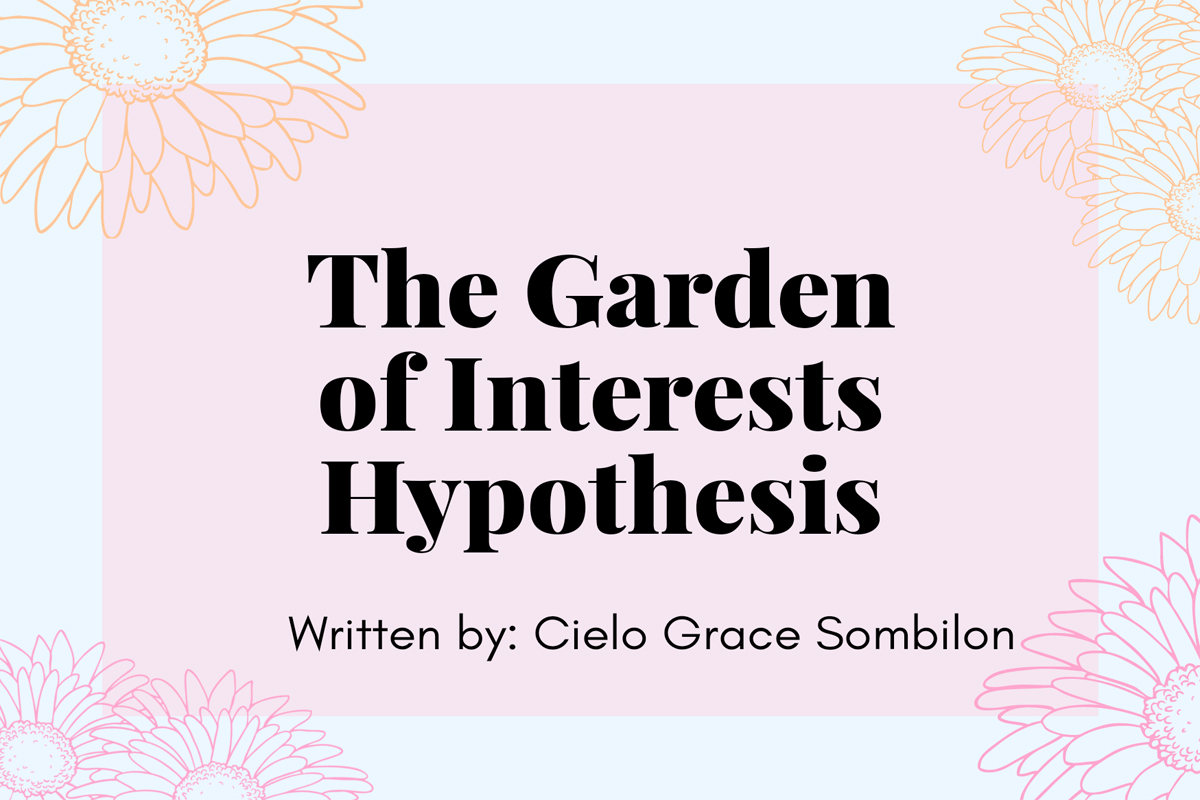THE GARDEN OF INTERESTS HYPOTHESIS
You are looking at a young flower in the garden. You are focused when a beautiful yellow rose revealed itself in the middle of the bushes. The loveliness of the rose captured your interest and curiosity. You walk towards the place where the pretty yellow rose is. This situation is a hypothesis I called, ‘The Garden of Interests’.
The aforementioned theoretical event is constructed by metaphorical statements. In this circumstance, the ‘young flower’ refers to the responsibilities you need fulfill; whereas the ‘yellow rose’ relates to the things and other leisure activities that we want to do while currently working on something that is more beneficial to us. These happen, of course, in the ‘garden’, our mind and body.
So, how did I come up with this idea? Well, it’s primarily because of the commencement of classes for this school year. I am in tenth grade, and I was waiting for the classes to start again for months already since the pandemic has begun. I was so excited when I knew about the date and the methods that we’re going to follow for this school year. There were challenges along the way, but I badly want to get back to real academic studying again, even just virtually. It seems like I have renewed my zeal for diligently pursuing my studies in between the months of March to September, where stringent community quarantines and other pandemic related events and actions have taken place. Then, the fifth of October came, the official day of the beginning of classes, and I was cap-a-pie bewildered. The obvious question is, how come did I feel that way when I was undeniably alacritous to get back to school in the first place?
Because my brain is overstimulated, my mind baffled on whether which task do I need to do first and which activity can wait until I finish. I don’t have an incisive take on my main objectives and priorities. Lastly, I wasn’t able to use my time in an effective and productive way.
Now, let us go back to my ‘Garden of Interests’ hypothesis. In my case, the ‘young flower’ is my unfinished school activities, impending house chores, and other necessities to be fulfilled. On the other hand, the ‘yellow roses’ are the distractions and not very substantial things that I do. The ‘garden’ refers to my mind, along with the physiological actions that made my body to do the things that I do.
Relating all these every day, the yellow roses overrule the young flowers. Why are these yellow roses much easier to do? It’s because they are already fully bloomed, just waiting for us to pick them up and dive into their wonders. The young flowers, like academic modules, quizzes, assessments, Math problems, washing the dishes, cleaning your room, tidying up your house—they normally take much more time to do. They require more a lot of processes. Realistically, our minds drift off somewhere else that’s far from where we are supposed to be. So, instead of answering, say, our school activities, we disregard it, we procrastinate, then we jump on checking our social media accounts, gaming until we forget what we supposed to finish.
The Garden of Interests is deceiving and confusing. See, there are a dozen flowers in the garden; there are the little young ones and the fully bloomed ones. There are many options, but we must carefully analyze first what we choose, or prioritize before jumping on to another flower, or a different activity.
Personally, my Garden of Interests is quite messy and unorganized. I decided to make a daily or weekly schedule of all the tasks including my school activities, house chores, and even my time allotments for social media and the internet. In my journal, I write the question, “Did I do all of my tasks today?” and put two boxes below which shows the options: ‘Yes’ and ‘No’. If yes, then well done, it shows that I have managed to patiently and efficiently wait until the young flowers completely grow before I focus my attention on the awaiting yellow roses. If my answer happens to be ‘no’, then it means I shall persevere more and dedicate my time and attentive consciousness to things that I need. When I finally finished it, that’s when I can do what I want.
Learn how to determine your needs and wants. Make a schedule and follow what you have written or listed down. Practice the art of less procrastinating. Make more use of our time and energy. Learn how to prioritize what’s more important. Make your life more productive and creative. When we do these methods, we discover, and therefore we learn. We learn how to water every flower in our Garden of Interests so that they will all grow bloomingly, happily, satisfyingly, and vibrantly. In this way, we enjoy ourselves. Remember if you take good care of your flowers in the garden, they will grow healthy. It‘s just the same as our lives, if we learn how to be patient, goal-oriented and persevering, we would develop a much more effective and nourishing way of living. We would all grow beautifully.














